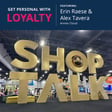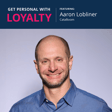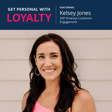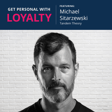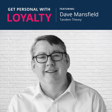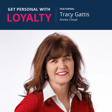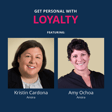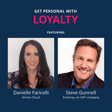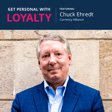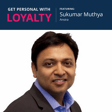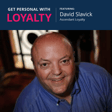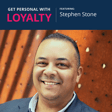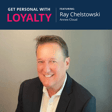Become a Creator today!Start creating today - Share your story with the world!
Start for free
00:00:00
00:00:01

From Tracking Points to Delivering Value (ft. Phil Shelper)
In the premiere of season three, we speak with Phil Shelper, CEO of Loyalty & Reward Co. With over 13 years of industry expertise, Phil sheds light on shifting loyalty programs from marketing tools to business growth engines and the key business outcomes that loyalty can deliver. We explore how to strategically design programs that drive customer retention, increase revenue, and elevate your brand in the competitive landscape.
Transcript
Introduction to Loyalty and Personalization
00:00:10
Speaker
Get Personal with Loyalty, where we're discussing using loyalty to deliver personalized, relevant customer experiences. Hello, everybody, and welcome to the next episode of Get Personal with Loyalty.
Meet Phil Shepler, CEO of Loyalty and Reward Co
00:00:22
Speaker
I'm here today with Phil Shepler from Loyalty and Reward Co. He is the CEO and founder. Welcome, Phil. Hi, Erin. How are you doing today? I'm doing really great. Greetings from sunny Sydney.
00:00:33
Speaker
I'm Chicago, and it's sunny here today as well. Well, thanks so much for joining me today. We were talking before we got
Are Loyalty Programs Effective?
00:00:40
Speaker
on. As we start off this new season, I really thought it was important to talk about loyalty programs and loyalty strategies.
00:00:49
Speaker
Over the last, I don't know, few months, it seems to me I've been hearing more and more about, is loyalty effective? Programs are scaling back, why? And I just really like to dig into, is loyalty a viable strategy? And if so, what makes it so? Sounds great. Let's go.
00:01:07
Speaker
All right. So why do you think this whole skepticism around loyalty exists?
Impact of Poor-Quality Loyalty Programs on Trust
00:01:13
Speaker
I think there's a couple of things. Firstly, we just need to be honest with ourselves as an industry. There's way too many really poor quality loyalty programs out there. A lot of consumers have had the experience of
00:01:25
Speaker
Engaging with a retailer, being signed up for the loyalty program, not getting any value out of that. So they might have a few points sitting there in their account. They don't actually see any value being delivered to them. And then suddenly they start getting an email every day trying to sell them stuff that they don't really need.
00:01:42
Speaker
And so it doesn't really feel like they're being treated in a way that is designed to harness their loyalty, but instead they've been trapped in ambush of a marketing assault and just doesn't work for them. So particularly younger demographics been severely turned off loyalty.
00:02:00
Speaker
for that reason. People engage with loyalty programs because they perceive they're going to get value from doing so and they continue to engage because they perceive they're going to get value. There's too many loyalty programs out there that aren't delivering any meaningful value to them, the mass of their base. And so people get quite turned off about the idea of engaging with them.
Challenges in Proving ROI and Finance Pushback
00:02:20
Speaker
We're hearing more and more that people don't want to join a loyalty program because they don't want to give the email address because they'll get spammed. So it's a real problem.
00:02:28
Speaker
And then I think the other thing as well is within companies, Law Team Managers are not doing a good job of demonstrating what the return on investment is for the Law Team Program. We were speaking with Christine Aziliani from Palmer University in Italy at the end of last year. She did some research recently which said over 60% of Law Team Managers in Italy cannot demonstrate the return on investment that their Law Team Program delivers. We were at a conference in Amsterdam in October of last year
00:02:57
Speaker
And the vast majority of the loyalty managers there from major brands, major global brands said, yeah, we're really struggling to understand whether the program is delivering a positive bar or not. And so when the conversation comes up with the CFO and increasingly companies are being run by accountants, so someone with a strong finance background will be rising to the position of CEO. When the conversation comes up about whether they
00:03:24
Speaker
could continue investing the amount of money they are in the loyalty program or whether they could cut some of the cost out of the business by reducing the value provided to members. It's very hard for the loyalty manager to argue against that because they've not succeeded in demonstrating what the program's doing.
00:03:40
Speaker
Wow. I had hoped and expected to hear certain things from you. This one really didn't. I guess I think about just different promotions that people are able to run. And when you know who the customer is and you have the levers to pull based on their attributes and you can do things that are more personalized, just one campaign can give you amazing return almost enough for the whole program.
00:04:03
Speaker
How do you think we got to this place where we're not able to do an ROI? Is it because we didn't do a great job of holding out control so we don't really understand the incremental aspects loyalty is bringing in or were too many people just rushed to do something because their competitors were and really didn't have the KPIs in place in the structure in place to gauge return from the
Strategy and Education in Loyalty Program Implementation
00:04:29
Speaker
beginning?
00:04:29
Speaker
Yeah, it is complex. I think there's a number of factors there. Firstly, businesses not really detailing the strategy for implementing the loyalty program. A lot of companies have the attitude of, we need a loyalty program, so let's just get one in. And it only needs to be basic just so that we can tick that box. And so they end up with something suboptimal that
00:04:50
Speaker
isn't set up to be able to continue evolving based on what works best for customers and how they want to engage with it. There's a lack of education within the loyalty industry as well, so people are not as well educated as not as experienced as they probably need to be to take on that task of designing a best practice loyalty program.
Complexities in Designing Loyalty Programs
00:05:11
Speaker
Companies tend to be quite myopic when they're considering the type of loyalty program they might implement, so they'll usually just
00:05:18
Speaker
look at competitors within the industry and replicate what they're doing and try to do it a little bit better rather than looking outside the industry for inspiration. Loyalty is a little bit like advertising. Everyone's an expert on advertising because everyone's watched ads on TV. But if you talk to a genuine advertising expert, you see what an absolute combination of art and science it is.
00:05:40
Speaker
And I think loyalty is the same. People have joined a loyalty program, so they feel like they know how to design a loyalty program. It's just not the case. So I think companies get deluded about the fact that
Technology Challenges in Loyalty Programs
00:05:51
Speaker
it is a lot more challenging to do it properly than what they might expect. And then on the technology side.
00:05:57
Speaker
We see most companies have legacy tech, they're not set up to deliver a program that is going to be best practice based on what they've currently got. They don't want to invest in the tech or they don't take the time to implement a robust solution and so they get stuck with a platform that's not able to enable the loyalty program to continue to evolve as well. So it's a
00:06:20
Speaker
That's it. It is it is a real mess out there. And I think where most companies need to start is acknowledging that they need expertise to do it properly. They need to go in eyes wide open in terms of the investment required. Do it properly, both from a tech perspective, consultancy perspective and ongoing operations in order to make sure that they get it right.
00:06:39
Speaker
a great point. I'm glad we're having this conversation then because it sounds like it is needed. Add to some of the challenges that I'm seeing and to kind of layer on what you said as I also have heard a number of organizations and we're seeing it in the news to where there was a program that was in market and now people are seeing that it's too rich.
00:06:59
Speaker
Maybe it's tied to the ROI piece where the DFO or whomever begins to take a look at what's going on and is like, oh, wow, this is really expensive or we're getting warranted or not. And we're seeing a lot of programs kind of scale back from that perspective.
00:07:15
Speaker
is certainly one thing. And then on the tech, I have to agree too. I've been really amazed at some conversations I've been having lately with really big companies with really well-known program where they're coming in and talking about, okay, well, I want to get an issue in this particular region and I want to pull data on that region and be able to send something to those people that have purchased there. And they're not able to do something
00:07:39
Speaker
as basic as that, which I think is difficult as well, because then you don't have the levers and loyalty that you need to be able to really be effective. Yeah, that's exactly right. And sometimes there's even an unwillingness within the business to want to do stuff best practice. We've had major multi-billion dollar clients in the past who are sending same email to their entire customer base five to six times a week. And we've had conversations with them about best practice
00:08:05
Speaker
marketing execution and the response has been, yeah, but we don't want to do that. Because every time we send an email, we get a little sugar hit of revenue and at the sales team, that in order to hit their weekly KPIs. So we're just going to keep doing what we're doing. But your unsubscribe rate is higher than your subscriber rate. Like your base is actually shrinking as a result of the approach you're taking. So they've been hijacked by the sales team and the whole loyalty strategy becomes corrupted.
00:08:34
Speaker
and I have been in this space a long time and we love it and know it really truly can
Phil's Principles for Effective Loyalty Programs
00:08:38
Speaker
work. So what does it take and where do we start in helping people on the fact that this does, loyalty does work if it's done well? Yes, I think the first thing is to understand what are the essential principles that underpin a best practice loyalty program. So
00:08:56
Speaker
That loyalty and award co-work developed our essential eight, which is detailed in our loyalty program as a complete guide. So I'll just talk three to these. So firstly, the loyalty program needs to be simple. So simple to join, simple to understand, simple to engage with. The best example of that is the coffee cart. You can join by picking it up. You can engage by getting a stamp. You can see how you're progressing towards a reward.
00:09:23
Speaker
The reward is perfectly tailored to the needs of the member. So do your best to make your program as simple as a copy card. It needs to be valuable. This is really the critical one. If you're not delivering value, then you won't get member engagement. It's that simple. So the loyalty operators should be constantly obsessing about where they're going to get more and more value to give to members. But it needs to be cost effective.
00:09:47
Speaker
So whether that is from within the business or whether it's from partnering up, that's where they should be spending a lot, a big part of their time. It needs to be stimulating. There's way too many boring loyalty programs out there that customers just aren't really enthused to engage with. So inject some fun into it, use digital games, use gamification, have really interesting out-there X-factor elements within the program.
00:10:11
Speaker
Our favourite programme of the past several years is Rip Curl. Club Rip Curl provides members with points when they transact, which they can redeem on future purchases. But members can also earn points for surfing waves, which is just so cool, such a cool idea. Quintessentially aligned with the brand, no one's going to be able to replicate that, creates lots of talkability. So what's your X Factor element within the programme?
00:10:36
Speaker
should be emotional, so make people feel a sense of belonging and explicitly. This is important to me and I want to be a member and retain my membership. Should be complementary to the brand, so once again very representative of what the brand stands for. Ideally it's differentiating so that it helps the brand contrast versus competitors and step and pop out in positive ways so people view it more favorably. It has to be cost-effective so everything we've talked about with
00:11:05
Speaker
with return on investment. So do the hard yards on making sure that the commercials are solid and that there's the ability to track the benefits that it's delivering.
00:11:15
Speaker
And finally, it needs to be set up to evolve. Probably about 50% of the consulting work that we do at Lawton Wardco is redesigning an existing program. And the conversation typically starts with, well, we launched this about five years ago and we've not really done anything with it. And we think it's time to take another look at it. So don't launch a static program, launch a framework with elements that can be swapped in and out and allow it to evolve over time based on customer feedback and
Loyalty Programs and Digital Transformation
00:11:45
Speaker
analytics.
00:11:45
Speaker
So that you don't launch the program, you launch a framework and the program evolves over the space of one to two years. And that's where you get something really rich and delivering some amazing benefits. I love that. I always talk about, loyalty is anything but set it in for data.
00:12:03
Speaker
But I love the launch a framework and said it's just such a great way to think about it. I've always thought about it is do something that's more simple with all the components that you've talked about. Even some of the things like the emotional aspects and the exclusivity, those can almost be like I call them overlays on top. So things that you can maybe possibly bring in and out.
00:12:27
Speaker
I've never talked about it as succinctly as the way you just did by the launching of a framework. I think that's a really great way to look at it. Also, I think if you're selling it internally, you're able to describe that then to management. Because I also think that to earlier points, maybe one of the challenges that's happened is people go out and they're like, okay, I'm doing a loyalty program and they launch it. Then even the stakeholders that were involved to start with,
00:12:54
Speaker
You're like, OK, great, we're done. Kind of wipe their hands a bit and go on to whatever else they're doing. Whereas if you set it up this way where we're launching a framework that's going to continue to grow, you now have a foundation to keep people engaged, even internally, as you go. Yeah, that's exactly right. Yeah, absolutely. Absolutely. I think the best way for a loyalty program manager to maintain engagement within an organization is through
00:13:25
Speaker
using the program to generate good quality reporting and analytics. So when we're working
00:13:31
Speaker
With our clients, mostly big brands, we start by interviewing key stakeholders across the business and consistently the major complaint that we hear from people is I'm being asked to make strategic decisions as part of my role, but I can't get the analytics and insights and reporting that I need to be able to justify and support the decisions that I need to make. So the great thing about a loyalty program is it's perfectly designed to
00:13:59
Speaker
collect data from members, have that structured appropriately, build out all of the reporting, the dashboards, the insight that can then be shared across the business to support that strategic decision making. If the loyalty program is just delivering that, it's delivering ridiculous amounts of value and demonstrating its worth, particularly to the CFO and the CEO.
00:14:25
Speaker
And it's going to then, rather than them looking at it saying, how can we cut some cost out of this thing? They're going to be looking at saying, how can we invest more in this thing so we can get more of what we need here? That too, I think, is golden. I'm going to say it in more of my layman's terms, maybe a little bit more basic. But loyalty, I think, in a lot of people's minds, sits in a corner of marketing. You've got your advertising, you've got acquisition, you have
00:14:52
Speaker
You have digital, you have CRM, and then you have loyalty, and it's, again, kind of back in the corner, and you're focused on retention, perhaps.
00:15:03
Speaker
But loyalty can, if it's recognized by management, really affect more key business outcomes is what I
Driving Strategic Decisions with Loyalty Programs
00:15:12
Speaker
think you're saying. So strategic decision making, I think were your words. Can you expound on that? If loyalty is brought out of the closet and really used across the organization and embraced across the organization, what can it do from that bigger business perspective?
00:15:31
Speaker
Yeah, so we've worked with a couple of clients where we've used the loyalty program as a catalyst to roll out a full digital transformation right across the business. So most companies out there are stuck with legacy tech and they just don't know where to start in terms of replacing that tech with something that is going to be more modern and more flexible. So starting with the loyalty program is a great way to do it.
00:15:58
Speaker
the company to start signing up members, collecting data about them, starting to better understand who they are, what their needs are, how they can better deliver to those needs.
00:16:09
Speaker
That can then be used to build out good quality reporting analytics capabilities. So start to build out, you've done a warehouse, put in a good quality CRM. Suddenly you go from, we were having this conversation with a client the other day where we said, you have basically 6 million people every year flow in and out of your properties. And it's a great blob.
00:16:34
Speaker
So literally every day you have a grey blob flow in and flow out and you don't know anything about them whatsoever. So if you can use the loyalty program to start to clear away the grey blob and get a sense of, oh, this is actual people and build out some segmentation. The value to that is astonishing for a business. It can completely transform how they view everything that they're doing. From there, the ability to build out a lifecycle marketing strategy is really important. So now you can start to
00:17:03
Speaker
provide communications, offers, and experiences to those members, particularly the higher value members, in order to build closer relationship with them and make them feel recognized and rewarded for what they do. From there, you can take that all the way to full omni-channel personalization. As a customer or as a member, if I engage with you through in-store,
00:17:26
Speaker
through online, through the app, through the call center or in any other way, I'm recognized and I feel recognized and my experience is tailored to what you know about me as an individual. And so suddenly I feel really important to that brand and I want to reciprocate by being loyal to that brand. I love it. Just being able to integrate, like you said, across all the different channels and I think that's
00:17:51
Speaker
Kind of the premise of having started this podcast and talking about it being get personal with loyalty because loyalty really can help you drive that personalization everywhere that you are connecting with your customer. Yeah, that's right. And any any company that is consumer facing should be obsessed about omni-channel personalization because the companies that are going to win over the next decade are the ones that successfully deliver omni-channel personalization across every aspect of their business.
00:18:21
Speaker
And the ones that don't do that, they're going to fall behind so far that they'll never be able to catch up. So every company in the world should be on that journey. And if you haven't started that journey, start with the loyalty program, because that's the first step that will provide you with what you need to keep moving towards that goal. You said something a while back and reminded me of it as well. The commitment to loyalty. So you talked about doing loyalty. It will be important to help you reach these goals.
00:18:50
Speaker
But yet, you need to do it right. You need to make sure you have the right strategy. You need to make sure you're watching the right KPIs. You've got the right analytics. There could be people listening to this going, okay, well, gosh, that sounds like a lot of work. We certainly, I don't think, want to be scaring people away from loyalty because there's a lot to it. How do you coach your clients and people that you're talking to? I'm assuming it has to do with like, hey, there really is this true, amazing,
00:19:14
Speaker
outcome that can happen. Yeah, how do you kind of get them past that, you know, we're just talking about this going, okay, I'm bored, but like, there's a lot to do. There is a lot to do. Yeah, exactly. And we do scare some clients, some prospects away, unfortunately, by just opening their eyes to
00:19:29
Speaker
what is really required to implement the best practice loyalty
Tailoring Loyalty Programs for Customer Behavior
00:19:33
Speaker
program. We start the conversation with a definition. So preferred definition of a loyalty program is a desirable behaviour stimulation program. So we'll work with them to map out all of the different customer journeys in how customers engage with them as a company.
00:19:48
Speaker
And then we'll say, OK, each step of that journey, what is it that you want that customer to do and what's in the best interests of the customer to do that particular behavior? That then gives us a blueprint to then say, right, well, based on wanting to stimulate those different types of behaviors,
00:20:04
Speaker
based on the type of company that you are, the rewards that you've got access to. Here are a range of different loyalty program designs that would best your business and let's now sit down and workshop which of those is going to work best to deliver to your needs. I think most people have had exposure to points programs and you know maybe some other forms of programs such as credit based programs or and tier programs but there's a lot of loyalty programs out there
00:20:33
Speaker
We also start by educating our clients on all the different types of approaches used by companies around the world. So within the book, we've got 10 major categories of loyalty program designs and 27 subcategories. And there's an infinite variety of combinations of those. And then you've got subscription models as a completely separate category as well. Opening their minds to what's possible is important and
00:20:59
Speaker
letting them recognise that what we will come up with for them will be bespoke and perfectly tailored to what they're wanting to achieve as a company, but it does require a lot of work. So that whole process of
00:21:12
Speaker
designing a program, market researching it, doing the commercial models, technical documentation, the life cycle strategy. You need to allow a good three to four months for that process in order to get the best outcome. Oh, thank you for that. Skiing with things, that's not so bad. You know, we started talking about it's like, well, how long does it take to get your head around all this stuff? You could be thinking maybe six to 12 months, but you know, more in the three, four or five months range, that seems very reasonable and you can have
00:21:40
Speaker
actually a strategy that sound for you still this year that you could begin to implement and make impact either later this year or early next, which I think is really important for people to take away from this. Also, as you were talking, I was thinking about the fact that having a partner like you guys
00:21:57
Speaker
is really important because you can take this big massive undertaking and you really you're very skilled at chucking it out in bite-sized pieces for people to get excited about understand and then move on to the next piece and then it all comes together. I will plug you as well and say that one of the things that I've been really impressed with you guys is linking it to an interior designer
00:22:20
Speaker
You can hire into your designer who does absolutely the same kind of style to everybody and everybody's house you walk into all looks the same. It might be very stylish, but everybody looks the same. But when when you're designing the house, so to speak, the loyalty program, you guys really do dig into your point around there's an infinite number of
00:22:39
Speaker
combinations of the way that you can build your strategy. And it does need to be driven by your brand and your customer or your member to really make it right. Yeah, that's right. So I think a loyalty program, launching a loyalty program is a big investment.
Investment in Loyalty Program Design for Success
00:22:54
Speaker
And once it's launched, it's something that you're going to have to maintain for many, many years. So doing that upfront design and making sure that you get that right design is a pretty important investment.
00:23:07
Speaker
because if you get it right, the downstream implications are immense. If you get it wrong, then causing a lot of trouble for yourself in the future. So it's definitely important to ensure that that design is as the best that it can possibly be, that's for sure. And like you said, and create it as a framework so that it's agile enough to pivot if necessary.
00:23:27
Speaker
Yeah, exactly. It's got that flexibility as a core element of the design. All right. Hopefully a fun question. So who's doing it right? Who's doing it well out there? Yeah, I think some some industries have an unfair advantage. So if we go back to that premise, that value is what primarily drives loyalty program engagement. There's companies out there that have access to what we call efficient rewards. So that's where it doesn't cost the company much to provide it. The member values it very highly. So airlines have an empty seat on a plane.
00:23:55
Speaker
car rental companies have a better value car that they can provide. You've got hotels with empty hotel rooms, cinemas who can give away free movie tickets and popcorn with crazy margins on it, cosmetics companies do it really well with free samples that their suppliers provide. So those types of companies typically are the ones that do the best
00:24:16
Speaker
from a loyalty program perspective because they can provide that cost-effective value that other companies can't. Then you've got the really big companies that have consistent shopping behavior from their members, so the supermarkets in particular, where they get suppliers to fund a lot of the benefits. They're collecting obscenely large amounts of data on their members and they're using that in very effective ways.
00:24:40
Speaker
using AI engines to do hyper-targeted messaging and offers to their members. They're doing a really great job of things as well. The supermarkets are in a bit of a boom time at the moment. Because of their economic downturn, they're having record numbers of members join their programs, but they've also had large numbers of lapsed members returning to them, which is almost unheard of in the loyalty industry, typically once you lose a member, very hard to get them back. So the supermarket programs are
00:25:06
Speaker
absolutely booming at the moment and they set up very good structures by which they get a lot of supplier funded benefits. They can be seen to be giving a lot of value to members without having to cover the cost of it as well. Great and lots to learn from those and I think if you're one of those companies that doesn't necessarily have that you could probably bring it in through partnerships as well might be a way you might advise them.
00:25:27
Speaker
Yeah, absolutely. That's right. Great. Well, Phil, thank you so much for the conversation today. We've covered a lot of ground, given us a lot of tips and the eight essential components that you need to have a successful loyalty program would be great for people to be able to capture. Anything we missed, any other closing thoughts about the fact that loyalty works?
00:25:49
Speaker
Yeah, look, it certainly does work. I think there is a lot of naysayers out there, and it's very easy to point to programs that don't work and say, based on that, we've now got evidence that loyalty programs don't work. It's a ridiculous argument. Loyalty programs have been around since at least the 1850s, where BT Babbitt is the inventor of the individually wrapped bar of soap, launched his program in order to sell more soap
00:26:13
Speaker
around the world and they've definitely stood the test of time. So you know over 170 years later they're stronger and more prominent than ever.
Relevance and Effectiveness of Well-Designed Loyalty Programs
00:26:21
Speaker
So they certainly can work and they certainly do work if designed properly. Getting that design right is critical to everything and getting the technology stack in place to support the evolution of that design is critical as well. I think everyone, every company out there
00:26:36
Speaker
needs to be seriously considering a best practice loyalty program. You're here. Thank you, Phil. Full discussion. Really appreciate you joining us and kicking off this new season of Get Personal with Loyalty.
Resources and Contact Information for Loyalty and Reward Co
00:26:48
Speaker
How can people get a hold of you if they want to talk more about this?
00:26:51
Speaker
Yeah, so they can visit our website, loyaltyrewardcode.com. You can also jump onto Amazon and search loyalty programs, and they'll find loyalty programs, the complete guide, which is the loyalty Bible. So grab a copy and find out everything you can about loyalty programs. Definitely. We'll make sure to put a link to that in our show notes. Everybody at Ann Its Cloud has their own copy. It's wonderful. Thanks a lot, Phil. Thanks, Erin. Thanks for listening to this episode of Get Personal with Loyalty.
00:27:20
Speaker
Join us next time for more loyalty insights. Until then, dare to dream. Let Annex Cloud help make your dreams a reality. Visit annexcloud.com
